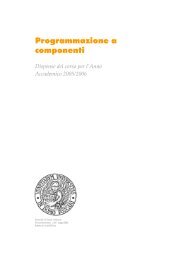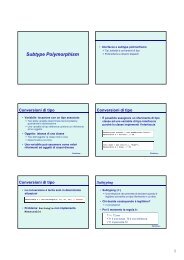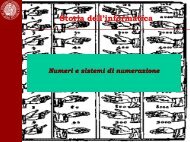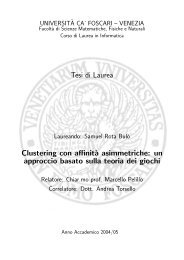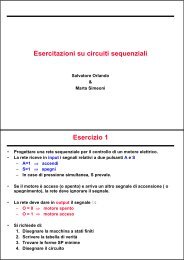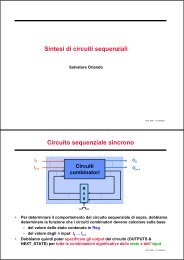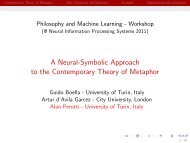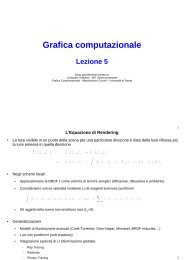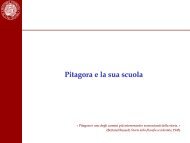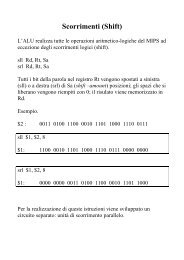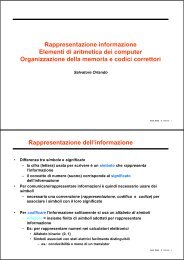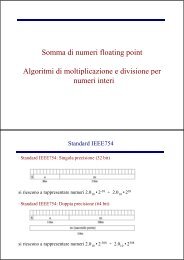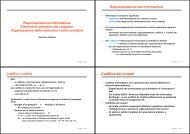Foscari - Dipartimento di Scienze Ambientali, Informatica e Statistica
Foscari - Dipartimento di Scienze Ambientali, Informatica e Statistica
Foscari - Dipartimento di Scienze Ambientali, Informatica e Statistica
You also want an ePaper? Increase the reach of your titles
YUMPU automatically turns print PDFs into web optimized ePapers that Google loves.
A few letters of my friends ore coming. (means a small number; but is neutral or positive)<br />
Few people come to the meeting. (means 'not many' and is negative)<br />
a little / little<br />
with uncountable nouns<br />
We have spent a little of the money already. (means a small amount, but is neutral or positive)<br />
You have little chance of succee<strong>di</strong>ng. (means 'not much' and is negative)<br />
A Write countable (C) or uncountable (U) after the following nouns.<br />
1 baggage 2 behaviour 3 suggestion 4 evidence 5 function 6 furniture<br />
7 help 8 insurance 9 job 10 idea 11 merchan<strong>di</strong>se 12 news<br />
B Underline the correct form.<br />
The Internet search engines are some / any oft he largest and most commonly used search engines on<br />
the World Wide Web. Their huge databases of millions of web pages typically index each / every<br />
word on each / every one of these pages. By using them, searchers hope to find every / all page that<br />
contains an occurrence of their search term.<br />
Several/ Enough search engine companies have boasted for years of the millions of pages indexed in<br />
their data base, and much / many others gladly announce the latest total number of pages, or URLs, in<br />
their data base. However, not all / every search engines can actually deliver the total number of results<br />
that they claim to find, and for the moment there aren't any / some that can make really intelligent<br />
searches which always find what the searcher was looking for. Despite this, most generate enough /<br />
several information for the general public but for serious researchers this may be too little / few.<br />
4 Future forms<br />
There are three main forms which we use to talk about the future.<br />
l be + going to + infinitive<br />
We use be + going to to refer to plans and intentions which we decided before the rime of speaking.<br />
He's going to change job next year. (He has already decided to do this.)<br />
Are you going to see the Louvre while you're in Paris?<br />
(Is this part of your planned itinerary?)<br />
We also use this form to make pre<strong>di</strong>ctions based on present or past evidence. In some cases we can<br />
already see that something is starting to happen. Look - it's going to rain. (The clouds are black.)<br />
They're not going to like these changes to the schedules. (past experience shows they don't like<br />
changes.)<br />
2 Present continuous<br />
We use the present continuous to talk about personal plans and arrangements in a very specific way,<br />
particularly when we mention the time and place.<br />
I am meeting Catriona at 4.30.<br />
They're flying on Wednesday.<br />
87



